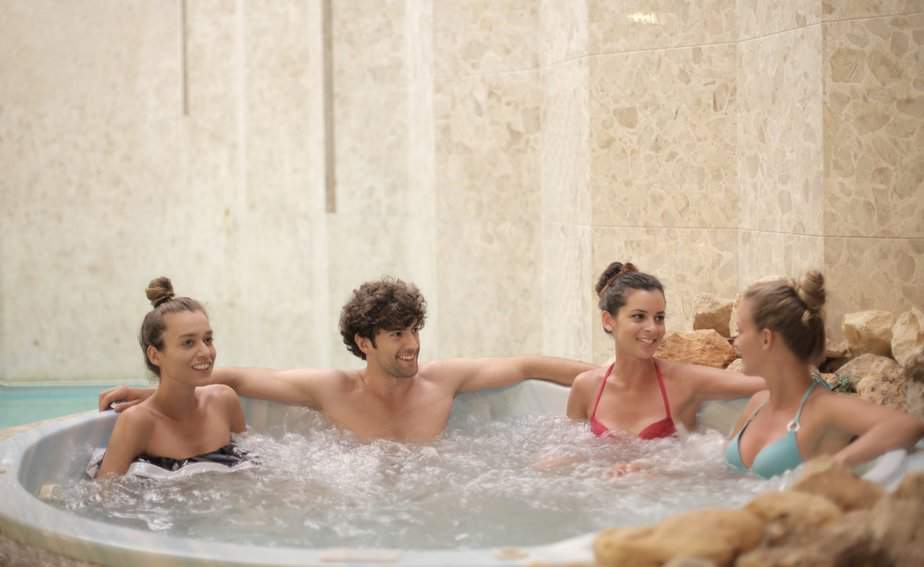Have you ever wondered if you actually sweat while soaking in a hot tub? It’s a question many people ask, especially since being surrounded by water in a hot tub makes it hard to notice.

Yes, you do sweat in a hot tub. Hot tubs raise your body temperature significantly, and this can cause you to sweat as your body works to cool itself down.
In the following sections, we’ll explore the various reasons you might sweat in a hot tub and any benefits it may offer, such as potential weight loss and improved blood circulation, so keep reading on to learn more.
Why Do We Sweat?
Your body is constantly working to maintain an optimal internal temperature, and when it gets too hot, you start to sweat. Sweating is a natural response to an increase in body temperature, and it helps keep you cool by releasing a salty liquid from your sweat glands.
As this liquid evaporates on your skin, it helps to lower your body temperature, keeping you comfortable and safe from overheating.

When you soak in a hot tub, your body temperature rises significantly higher than when you’re out of the water. This increase in body temperature triggers your body to sweat, which is an attempt to cool you down.
Your body doesn’t know that it’s in a hot tub and that the sweat will just mix with the hot water instead of evaporating on your skin. It will simply do what it physiologically does when it’s hot, hence why you will still sweat in a hot tub.
However, some sweat will still evaporate into the surrounding water, allowing your body to cool down somewhat.
How Much Do You Sweat in a Hot Tub?
As mentioned, when you spend time in a hot tub, your body temperature will increase which results in sweating. Just like any other warm environment, a hot tub can create a situation where your body needs to cool itself down.
According to Aqua Magazine, “the average spa user sweats up to three pints per hour at 102 degrees Fahrenheit.”
Several specific factors influence how much you might sweat while in a hot tub. These include:
- the duration of your immersion
- the water temperature
- your individual health and fitness levels
For example, the longer you stay in the hot tub, and the hotter the water, the more you will sweat. Those with a higher level of fitness may also find they sweat less than those who are less fit due to their bodies being more efficient at regulating their temperature.
Hot Tub Effects on Your Health
Increased Blood Circulation
Soaking in a hot tub can have positive effects on your blood circulation. The warm water raises your body temperature and causes your blood vessels to dilate, leading to better blood flow. This can help to lower your blood pressure. However, be cautious if you have a history of heart disease, as sudden changes in temperature and pressure can put extra strain on your heart.
Benefits for Muscles and Aches
If you’re experiencing muscle aches or arthritis pain, a hot tub session might be just what you need. The heat from the water and hydrotherapy can help to relax your muscles and relieve joint pain. This can be especially beneficial for people with chronic pain conditions.
Stress Relief and Relaxation
A hot tub can be an excellent place to unwind after a long day. The combination of warm water and massaging action from the jets provide a soothing environment that can help to ease stress and tension. Additionally, the peaceful atmosphere can encourage relaxation and improve your overall mental well-being.
Hot Tub Safety and Risks

While there are many benefits to using a hot tub, it’s important to be aware of the potential risks and ensure that you are using it safely.
Prolonged exposure to heat can lead to dehydration, overheating, and even fainting if you’re not careful. To avoid these issues, make sure to drink plenty of water before and after your hot tub session and don’t stay in for an excessive amount of time.
Keep in mind that if you have certain health conditions, hot tubs may pose additional risks. For example, if you have heart disease or high blood pressure, it’s best to consult with your doctor before enjoying a hot tub to ensure it’s safe for you.
Tips for Safe Hot Tub Use
Using a hot tub can be a relaxing and enjoyable experience, but it’s important to keep safety in mind. Here are some tips for safe hot tub use:
- Hydrate before and after hot tub use: Soaking in a hot tub can cause you to sweat and lose fluids, so hydrate before, during, and after your session. By drinking plenty of water, you can prevent dehydration and maintain your body’s balance.
- Limit the duration of immersion: Don’t soak for too long in a hot tub. Prolonged exposure to warm water can lead to overheating and dizziness. Limit your time in the water to periods of 15-30 minutes before taking a break.
- Monitor your body’s response and know when to get out: Pay attention to how your body feels during your hot tub session. If you start to feel lightheaded, dizzy, nauseous, or too hot, it’s time to exit the tub and take a break.
- Take frequent breaks: Make sure to take breaks every 15-30 minutes, especially if you’re new to hot tub use or have a medical condition. These breaks allow your body to cool down and regulate its temperature, preventing overheating.
- Recommended cool-down practices post-hot tub: After exiting the hot tub, it’s essential to let your body temperature return to normal. One way to cool down is taking a lukewarm shower. You can also drink cold water and rest in a cool area until you feel comfortable.
Frequently Asked Questions
How long should I stay in a hot tub?
Staying in a hot tub for 15-30 minutes at a temperature between 100-102 degrees Fahrenheit is generally recommended for relaxation and therapeutic benefits. However, listen to your body. If you start feeling lightheaded or dizzy before that, then get out of the hot tub and cool down.
What are the signs that I might be overheating in a hot tub?
Overheating signs include dizziness, nausea, rapid heartbeat, and lightheadedness. If you experience any of these symptoms, leave the hot tub immediately and cool down. Remember, it’s crucial to regulate the tub temperature, usually not exceeding 104 degrees Fahrenheit, to minimize overheating risks.
How does a hot tub affect my skin?
Warm water in hot tubs opens up pores, which can help cleanse your skin. However, overly-hot or prolonged exposure to hot tub water might have adverse effects. You should follow proper hygiene, such as rinsing off before and after hot tub usage, to maintain healthy skin.
Can soaking in a hot tub help burn calories?
While soaking in a hot tub may cause you to sweat, it does not burn a significant amount of calories. However, it can help with relaxation and recovery, making it a beneficial addition to your overall wellness routine. Remember, it’s still essential to engage in regular exercise and maintain a balanced diet for optimal health.
How does sweating in a hot tub compare to sweating in a sauna?
Both environments can induce sweating, but there are slight differences. Saunas generally have hotter temperatures and lower humidity levels, which can cause more intense sweating. Additionally, hot tubs are often used for relaxation, while saunas are more commonly utilized for detoxification purposes.
Sources:

